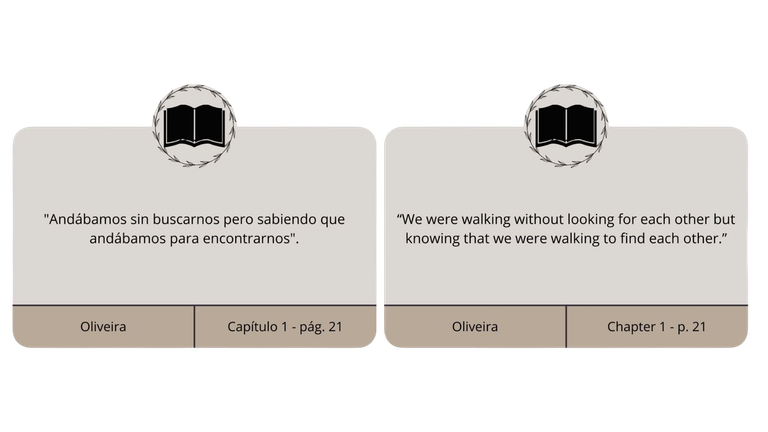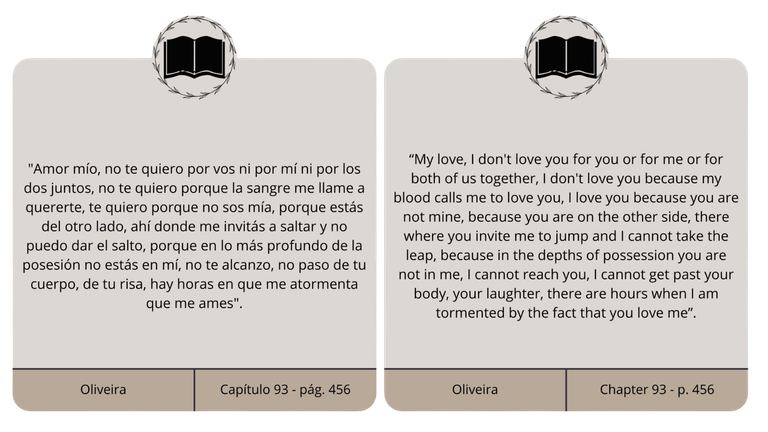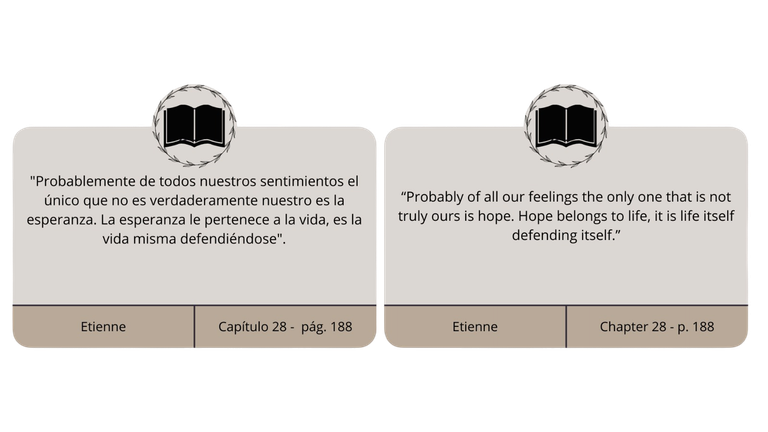Reseña: Rayuela ✨ BookReview: Hopscotch

%20(1).png)

-Español/Spanish-
-Español/Spanish-¡Hi, mis hermosos gislanders!
Hoy les comparto la reseña de uno de tantos libros que he tenido el placer de leer. Siempre desde una aspiración sincera de que más personas disfruten de la literatura, pues los libros nos brindan la posibilidad de vivir millones de vidas dentro de la única que tenemos. Vivir esas vidas es una manera de burlar a la limitación del tiempo, pues nacemos para morir, pero lo importante es lo que hacemos con ese suspiro de vida, con ese poco tiempo que tenemos para disfrutar de estar vivos.
-Inglés/English-
-Inglés/English-Hi, my beautiful gislanders!
Today I share with you the review of one of the many books I have had the pleasure of reading. Always from a sincere aspiration that more people enjoy literature, because books give us the possibility to live millions of lives within the only one we have. Living those lives is a way to mock the limitation of time, because we are born to die, but the important thing is what we do with that sigh of life, with that little time we have to enjoy being alive.
Rayuela
Hopscotch
Julio Cortázar
Julio Cortázar
1963
1963
728 páginas
728 pages

|Horacio Oliveira: Un argentino que se supone que viajaría a París para estudiar, pero eventualmente desecha este propósito. Tiene 40 años de edad y un profundo conocimiento de distintos temas, por lo cual el aire sarcástico es parte de su fachada intelectual. Sin embargo, esa búsqueda de apreciar temas cultos solo lo alejan de responsabilidades acordes a su edad y lo hace participe de una arrogancia vacía y de alguna emoción real, a excepción de la profunda soledad que siente de manera constante.
|La maga (Lucía): Uruguaya joven quien también fue inicialmente a Paris a estudiar, específicamente canto, pero acaba perdiendo el tiempo en banalidades. Distraida, ingenua, culta en un nivel mínimo (a la vista de Oliveira y sus amigos), también posee una sensibilidad deslumbrante, la misma que Oliveira y los demás carecen. Por lo general son condescendientes con ella, la tratan de tonta y a veces se compadecen de ella. La maga menos que amor, siente una admiración intelectual por Horacio y una devoción sentimental, pero él suele tratarla tan despreciablemente (aun manteniendo relaciones intimas con ellas).
|Rocamadour: Hijo de La maga, quien queda a cuidado de una cuidadora en el campo para que ella pueda estar en Paris. Cuando el bebé enferma su madre lo busca para cuidarlo personalmente. Lo que desagrada a Horacio.
|Gregorovius: Miembro del Club de la serpiente, al cual pertenecen también La Maga, Horacio y el resto de sus amigos intelectuales). Está enamorado en secreto de La maga, pero no quiere interrumpir la complicada relación que ella tiene con Horacio. Siempre fue un gran amigo y se preocupó mucho por ella y juzga la actitud de Horacio con ella, porque simplemente el poco tacto que tiene Oliveira con La Maga a él no le faltaría.
|La Pola: Mujer francesa que termina siendo la amante de Oliveira y por la que La maga siente celos.
|Morelli: Un escritor del que El Club de la serpiente ha hablado varias veces, conocen su trabajo y descubren que también reside en Paris y ellos tienen la oportunidad de conocerlo. El personaje de Morelli de hecho es una especie de alter ego del propio escritor Julio Cortázar dentro de la obra. Y hace un par comentarios sobre el libro que ha escrito, el cual puede leerse de diferentes maneras, como si se refiriera al propio libro de Rayuela.
|Traveler: Ya de vuelta en Argentina, Horacio se reencuentra con su mejor amigo de la infancia, quien es gran amante de la literatura y como la mayoría, admira a Oliveira por su conocimiento. Pero de cierta manera también comprende más adelante que Horacio se encuentra desequilibrado mentalmente.
|Talita: Esposa de Traveler, farmacéutica, pero al igual que su esposo y Oliveira, trabajan en el circo y luego en el manicomio. Le fascina el cine y tras tener una charla armoniosa sobre escritores y directores de cine con Oliveira, se siente menos desconfiada con él. Pero en varios momentos de desvaríos, Oliveira confunde a Talita con La Maga, y en uno de ellos termina besándola, lo cual la incomoda y se lo cuenta a su esposo.
|Horacio Oliveira: An Argentinean who was supposed to travel to Paris to study, but eventually discards this purpose. He is 40 years old and has a deep knowledge of different subjects, so the sarcastic air is part of his intellectual facade. However, this quest to appreciate learned subjects only distances him from responsibilities commensurate with his age and makes him partake of an empty arrogance and no real emotion, except for the deep loneliness he constantly feels.
|La Maga (Lucia): A young Uruguayan who also initially went to Paris to study, specifically singing, but ends up wasting her time in banalities. Distracted, naive, cultured on a minimal level (in the eyes of Oliveira and his friends), she also possesses a dazzling sensitivity, the same that Oliveira and the others lack. They are generally condescending to her, treat her as a fool and sometimes pity her. The magician, less than love, feels an intellectual admiration for Horacio and a sentimental devotion, but he often treats her so despicably (even while maintaining intimate relations with them).
|Rocamadour: Son of The Magician, who is left in the care of a caregiver in the countryside so that she can be in Paris. When the baby falls ill, his mother seeks him out to take care of him personally. This displeases Horatio.
|Gregorovius: Member of the Snake Club, to which La Maga, Horatio and the rest of his intellectual friends also belong). He is secretly in love with La Maga, but does not want to interrupt the complicated relationship she has with Horacio. He has always been a great friend and cared a lot for her and he judges Horacio's attitude towards her, because Oliveira's tactlessness with La Maga would not be lacking for him.
|La Pola: French woman who ends up being Oliveira's lover and for whom La Maga is jealous.
|Morelli: A writer that El Club de la serpiente has talked about several times, they know his work and discover that he also lives in Paris and they have the opportunity to meet him. Morelli's character is in fact a sort of alter ego of the writer Julio Cortázar himself in the play. And he makes a couple of comments about the book he has written, which can be read in different ways, as if he were referring to the book of Rayuela itself.
|Traveler: Back in Argentina, Horacio is reunited with his childhood best friend, who is a great lover of literature and, like most, admires Oliveira for his knowledge. But in a way he also realizes later that Horacio is mentally unbalanced.
|Talita: Traveler's wife, a pharmacist, but like her husband and Oliveira, she works in the circus and then in the asylum. She is fascinated by cinema and after having a harmonious chat about writers and film directors with Oliveira, she feels less distrustful of him. But in several moments of ravings, Oliveira confuses Talita with La Maga, and in one of them ends up kissing her, which makes her uncomfortable and she tells her husband about it.

TRAMA: Horacio Oliveira, vive en Paris subsistiendo con un trabajo normal, pasando sus días asistiendo a reuniones en el club intelectual del Club de la serpiente, donde hablan de música, libros, filosofía y metafísica. Mantiene encuentros intimos con una mujer joven llamada La Maga, pero por ella no siente más que atracción carnal y condescendencia intelectual. Eventualmente tiene una amante llamada La Pola. El vacio de soledad en su pecho rara vez desaparece y el hastío que siente por la vida afecta incluso a sus relaciones con los demás. Terminada caoticamente su estadía en Paris, decide regresar a Argentina. Allí se reencuentra con su mejor amigo y conoce a la esposa de este. Termina trabajando en un circo y luego en un manicomio, donde eventualmente terminan aflorando con ahinco todos sus problemas del pasado y el desequilibrio lo vuelve loco.
PLOT: Horacio Oliveira, lives in Paris subsisting on a normal job, spending his days attending meetings at the intellectual club of the Snake Club, where they talk about music, books, philosophy and metaphysics. He has intimate encounters with a young woman named La Maga, but for her he feels nothing more than carnal attraction and intellectual condescension. Eventually he has a mistress named La Pola. The emptiness of loneliness in his chest rarely disappears and the boredom he feels for life even affects his relationships with others. After his chaotic stay in Paris, he decides to return to Argentina. There he reunites with his best friend and meets her wife. He ends up working in a circus and then in an insane asylum, where eventually all his past problems come to the surface and the imbalance drives him mad.


Paris 1950, Horacio Oliveira, de 40 años de edad, a parte del trabajo modesto que tiene, también recibe dinero de unos parientes en argentina, de donde es oriundo. Había viajado a Paris para estudiar, pero pronto desiste. Luego conoce a La Maga, una uruguaya joven, quien también había viajo para estudiar, pero desiste también. Ambos tienen una relación intima un tanto desastrosa, más carnal que otra cosa, encuentros erráticos y poco amables. Ella desarrolla por él algunos sentimientos, sobre todo los de admiración intelectual y devoción. Oliveira tiende a causar un efecto de superioridad con respecto a los demás debido a su profundo conocimiento sobre muchos temas diversos, específicamente sobre arte, literatura y filosofía, por lo cual el resto tienden a fascinarse con él, en especial las mujeres. Pero ese profundo conocimiento no opaca sus actitudes desagradables, vacías y existencialistas altamente agrias.
El Club de la Serpiente es el grupo de Oliveira y sus amigos intelectuales. Debido a que La Maga tiende a estar tan enganchada con Horacio, ella también asiste. La maga a pesar de no entender todos los temas profundos, quiere hacerlo, así que les pide a los demás que le enseñen porque a Oliveira le fastidia terriblemente que ella no esté a su nivel.
Más adelante y a pesar de todo lo anterior, para economizar gastos de residencia, Oliveira y La Maga pasan a vivir juntos, pero su relación solo empeora. Horacio consigue una amante llamada La Pola y La Maga busca a su hijo Rocamadour para cuidarlo por enfermedad, por lo que terminan viviendo los dos y el bebé en el mismo piso.
La enfermedad de Rocamadour empeora y todos los del club los visitan en el departamento. Entre un altercado con un vecino de edad bastante mayor y la noche fría, Rocamadour muere en la cama de La Maga. Oliveira es el primero en descubrirlo, pero no hace absolutamente nada para advertir a La Maga, tampoco hace nada para consolarla, simplemente la ve brevemente antes de irse sin sentir lastima, compasión o simpatía por ella o el niño que acaba de morir. No le interesa lo suficiente, lo percibe como una situación tediosa.
Tras el funeral del bebé (al que fueron todos los del club, excepto Oliveira) La Maga desaparece profundamente dolida, Horacio regresa a las reuniones del club como si no hubiera sucedido absolutamente nada. Pero los miembros del club lo juzgan severamente por su despreciable comportamiento, como si no tuviera humanidad, por lo cual Oliveira decide salirse del club y dejar París.
De vuelta en Argentina, Horacio se reencuentra con su mejor amigo Traveler. Ambos trabajan en un circo y luego en un manicomio. La esposa de Traveler le recuerda a La Maga y entre desequilibrios mentales, culpas, remordimientos, crisis existenciales y la soledad que siente que lo consume, Oliveira alucina a La Maga y se cuestiona su vida hasta el momento.
En una última escena, Oliveira se encuentra a la orilla de una ventana en el manicomio completamente fuera de control, se desconoce si salta y muere o si se salva.
Paris 1950, Horacio Oliveira, 40 years old, apart from the modest job he has, also receives money from some relatives in Argentina, where he is from. He had traveled to Paris to study, but soon gives up. Then he meets La Maga, a young Uruguayan woman, who had also traveled to study, but also gives up. The two have a somewhat disastrous intimate relationship, more carnal than anything else, erratic and unkind encounters. She develops some feelings for him, especially those of intellectual admiration and devotion. Oliveira tends to cause an effect of superiority with respect to the others due to his deep knowledge about many diverse subjects, specifically about art, literature and philosophy, for which the rest tend to be fascinated by him, especially women. But that deep knowledge does not overshadow his unpleasant, empty and highly sour existentialist attitudes.
The Snake Club is the group of Oliveira and his intellectual friends. Because La Maga tends to be so hooked on Horacio, she also attends. La Maga despite not understanding all the deep subjects, wants to, so she asks the others to teach her because Oliveira is terribly annoyed that she is not at his level.
Later on and despite all the above, to economize on living expenses, Oliveira and La Maga move in together, but their relationship only gets worse. Horacio gets a mistress named La Pola and La Maga looks for her son Rocamadour to take care of him due to illness, so they end up living together with the baby in the same apartment.
Rocamadour's illness worsens and everyone from the club visits them in the apartment. Between an altercation with an elderly neighbor and the cold night, Rocamadour dies in La Maga's bed. Oliveira is the first to discover this, but does absolutely nothing to warn La Maga, nor does he do anything to comfort her, he simply sees her briefly before leaving without feeling pity, compassion or sympathy for her or the boy who has just died. He doesn't care enough, he perceives it as a tedious situation.
After the baby's funeral (attended by everyone in the club except Oliveira) La Maga disappears in deep grief, Horacio returns to the club meetings as if absolutely nothing had happened. But the club members judge him severely for his despicable behavior, as if he had no humanity, so Oliveira decides to leave the club and leave Paris.
Back in Argentina, Horacio is reunited with his best friend Traveler. They both work in a circus and then in an insane asylum. Traveler's wife reminds him of La Maga and between mental imbalances, guilt, remorse, existential crisis and the loneliness that he feels consumes him, Oliveira hallucinates La Maga and questions his life so far.
In a final scene, Oliveira finds himself at the edge of a window in the asylum completely out of control, it is unknown if he jumps out and dies or if he is saved.






El libro posee 4 maneras de leerse. La primera es proporcionada por el autor el la primera página del libro, es una gruía de saltos de capítulos para enriquecer la experiencia. La segunda es leerse solo la narrativa desde el capítulo 1 hasta el 56. La tercera es leerse el libro de principio a fin. Y la cuarta manera es la que imponga el propio lector.
Este libro a partir del capítulo 56 posee fragmentos que están relacionados con detalles mínimos pero importantes con respecto a la narrativa, también hay recortes de periódico relevantes, poemas, fragmentos de música y demás.
Dependiendo de la manera en la que decida leerse, el libro puede tener un final ligeramente distinto. Pero es claro que la interpretación del lector es la clave, sore todo con el final deliberadamente abierto que establece el escritor.
Está considerada como una antinovela, debido a que no sigue una estructura tradicional y lo narrativo está usado con un propósito distinto. Para el año en que se publicó fue una innovación total y está considerada una obra maestra a la par con títulos como “Cien años de soledad”.
Dentro de todo el libro existen diversas metáforas, alegorías y simbolismos entrelazados con el existencialismo, lo culto en el arte y la literatura, además de la apreciación de la vida desde un punto de vista menos empático.
The book has 4 ways of reading. The first one is provided by the author on the first page of the book, it is a series of chapter breaks to enrich the experience. The second is to read only the narrative from chapter 1 to 56. The third is to read the book from beginning to end. And the fourth way is the one imposed by the reader himself.
This book from chapter 56 onwards has fragments that are related to minimal but important details regarding the narrative, there are also relevant newspaper clippings, poems, fragments of music and so on.
Depending on how you choose to read it, the book may have a slightly different ending. But it is clear that the reader's interpretation is the key, especially with the writer's deliberately open-ended ending.
It is considered an anti-novel, because it does not follow a traditional structure and the narrative is used for a different purpose. For the year it was published it was a total innovation and is considered a masterpiece on par with titles such as “One Hundred Years of Solitude”.
Within the entire book there are various metaphors, allegories and symbolism intertwined with existentialism, the cultured in art and literature, as well as an appreciation of life from a less empathetic point of view.
El amor, El arte, La literatura, La influencia cultural de donde resides, La búsqueda de la motivación de la existencia propia, La soledad, los problemas de comunicación, los celos, El lenguaje, La locura y el comportamiento humano.
Love, Art, Literature, The cultural influence of where you reside, The search for motivation for one's existence, Loneliness, communication problems, jealousy, Language, Insanity and human behavior.

Es un libro complejo y si se busca conocer los libros de culto este es una opción. Los personajes cargan pesos peculiares y ello los hace reaccionar de manera poco racional la mayoría de las veces.
It is a complex book and if you are looking to learn about cult books this is an option. The characters carry peculiar weights and this makes them react in a non-rational way most of the times.

Bueno, gislanders... Hemos concluido.
Hasta aquí la reseña de esta oportunidad. Nos encontraremos de nuevo con la recomendación de otro maravilloso libro. Espero les haya gustado este en particular o al menos les haya despertado las ganas de leerlo a quien aún no lo ha hecho. Si tienen alguna recomendación de algún libro que quieran que yo reseñe, me lo pueden dejar en los comentarios. ¿Y tú, ya habías escuchado o te has leído este libro?
Well, gislanders... We have concluded.
So much for this review opportunity. We will meet again with the recommendation of another wonderful book. I hope you liked this one in particular or at least it made you want to read it if you haven't yet. If you have any recommendation of a book you would like me to review, you can leave it in the comments. And you, have you already listened to or read this book?

- El contenido aquí escrito es de mi propiedad. Si necesitas hacer uso de él, no dudes en comunicarte conmigo o mencionar a @gislandpoetic como creadora del mismo.
- Los separadores de texto son de mi propiedad. Y los banners de bienvenida/despedida son de mi creación y por lo tanto de mi propiedad.
- Todo lo antes mencionado es contenido original y exclusivo. Su uso para otros usuarios se considera plagio en todas las comunidades de Hive.Blog. ¡Por favor no lo hagas!
- Las imágenes aquí publicadas son originarias de PEXELS y modificadas en Canva, debajo de cada una se encuentran los enlaces propios de cada imagen para que puedan comprobar su procedencia.
- Agradezco todo el apoyo que pueda generar mi contenido de valor. Y para los gislanders que quieran conocer un poco más de mi, pueden ubicarme en...
- The content written here is my property. If you need to use it, do not hesitate to contact me or mention @gislandpoetic as the creator.
- The text separators are my property. And the welcome/farewell banners are my creation and therefore my property.
- All of the above is original and exclusive content. Its use for other users is considered plagiarism in all Hive.Blog communities. Please don't do it!
- The images published here are originally from PEXELS and modified in Canva, below each one you will find the links of each image so you can check its origin.
- I appreciate all the support that can generate my valuable content. And for those gislanders who want to know a little more about me, you can find me on...
@gislandpoetic
@gislandpoetic
%20(1).png)

!HUESO
Hola amiga , excelente novela , multi factorial , es un clásico de la literatura , te felicito amiga
Rayuela ha estado en mis manos muchísimas veces, no me han faltado ganas de lanzarme a él, pero por razones sin sentido, nunca he podido siquiera comenzar a leerlo, me da hasta vergüenza decirlo ya, con tantas veces que me lo he planteado, Cortazar es maravilloso y he disfrutado mucho con otras obras de él. La última vez que pensé seriamente en leerlo finalmente, fue cuando visité un restaurante que se llamaba "Rayuela" me pareció espectacular, pero heme aquí aún, sin argumentos para discutir contigo tan grandiosa novela jajaja.
Cada libro se abre paso a nosotros en el momento exacto en el que lo necesitamos. De seguro ese momento no ha llegado, no te preocupes.
Me encanta tus forma de hacer reseña creo que es muy completa, la verdad primera vez que escucho de esta novela pero su manera de estar estructura me llama la atención, un saludo.
I am working on some books of my own. Well done, do have a good day
Congratulations @gislandpoetic! You have completed the following achievement on the Hive blockchain And have been rewarded with New badge(s)
Your next target is to reach 38000 upvotes.
You can view your badges on your board and compare yourself to others in the Ranking
If you no longer want to receive notifications, reply to this comment with the word
STOPCheck out our last posts: